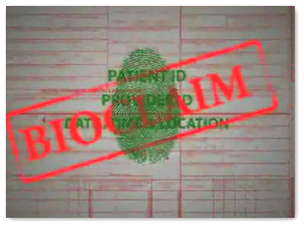The Biometric log in device replaces the usual and standard paper sign in sheet we have all used for years. The fingerprint is converted to a unique data code and not stored itself. This is the same system being used at Disney in Florida.
not stored itself. This is the same system being used at Disney in Florida.
75% of fraud is stated to be done by the provider as called “phantom billing”. The 1500 claim form will link and provide the finger print to show that the patient actually showed up. The software process will run before every claim is submitted.
The first visit enrolls the finger print and given the unique ID number to include the date, time and location and the template is stored at the BioClaim central data base. One item this adds is the fact that billing might be done faster. No finger print, no claim is filed. This will keep patients from trying to use another person’s insurance card. A claim would be denied immediately if the correct person was not linked. I would guess there might need to be some type of over ride added for an telehealth visit though as well if the practice is enrolled in one of those services, but individual software might have that taken care of to bypass. Basically the software is identifying the patient correctly and not allowing for any items to be billed where a fingerprint for the visit is not available. I have seen biometric log ins but this is somewhat the first I have seen combining check in with claim submissions. BD
From the website:
“Phantom Billing - This is billing for services that were not provided, billing for services to persons accompanying a patient who did not receive any medical  services, or billing for office visits that never occurred.
services, or billing for office visits that never occurred.
Card Swapping - This occurs when a patient receives treatments using another person's medical information.
Up-coding - This involves billing for more expensive treatments that services actually provided during a patient's visit.
Medical Identity Theft - This involves someone pretending to be someone else by using a person's name or other items such as an insurance card or number to obtain medical services. Medical identity theft can result in incorrect medical records being stored under the victim's name and insurance information.
Each of the above items are problems that result in a larger price tag for everyone; payer, provider and patient. Currently fraud detection is mostly done using computerized statistical analysis or by persons in the industry recognizing and reporting suspicious claims. This is a "pay and chase" methodology, pay the claim then, when fraud is detected, the fraudulent claims must be investigated further to provide proof that the claims are in fact fraudulent and then they can be pursued further. Each step of this process increases everyone's costs even further.
BioClaim™ recognizes more than the problem that fraud in healthcare causes but also addresses the failures of other biometric/smart card solutions. Other biometric companies claim they eliminate fraud using a biometric device but rely on the receptionist/front desk personnel to stop a fraudulent transaction if the biometric validation does not match. There is no record of the biometric validation that occurred during the visit leaving the payer to continue to rely on the "pay and chase" method.”
CORAL GABLES, US: Simply Healthcare Plans, Inc. (SHP), a Florida based HMO, has entered into a collaboration agreement with Biometric Technologies, Inc. where Biometric Technologies will assist SHP with its efforts to reduce and prevent healthcare fraud in Florida.
Biometric Technologies is a Florida based technology company that has developed BioClaim, a unique patented software product specifically developed for the detection of fraudulent healthcare claims. BioClaim uses biometrics to authenticate a patient at the point of service and interfaces the patient and claims information with the HMO claims system. SHP anticipates launching BioClaim with a select group of Medicaid providers in the next 90 days.
IT to treat healthcare fraud in Florida - CIOL News Reports





0 comments :
Post a Comment